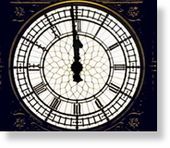
© Joe Cornish/GETTY10, 9, 8, 7, 6, 5, 4, 3, 2, 1, and 1 again, happy new year!
At midnight on New Year's Eve, time will stop momentarily. Guardians of atomic clocks around the world will add an extra "leap second" to 2008 to keep time synched with the Earth's rotation. Arguably, the rise of GPS makes this tweak unnecessary.
In 1972, global commerce began to set its clocks by Coordinated Universal Time (UTC), based on the oscillations of the caesium atom. The snag was that other things, such as shipping and aircraft navigation, still relied on UT1 time, which divides one rotation of the Earth into 86,400 seconds. But the Earth's spin is slowing, so the two systems gradually go out of synch. "Over the course of a millennium, the differences would accumulate to about an hour," says Robert Nelson of the Satellite Engineering Research Corporation in Bethesda, Maryland.
To compensate, the ITU, or International Telecommunications Union, adds a leap second to atomic time every few years. However, many argue that we should stop tinkering with time, not least because of the glitches it causes (see "Add second...").
Now a group within the ITU, called Working Party 7A - after deliberating over the leap second for years - has told New Scientist that it recommends abolishing the leap second. Group member Elisa Felicitas Arias, of the International Bureau of Weights and Measures in Paris, France, argues that a timescale that doesn't need regular tweaking is essential in an increasingly interconnected world. What's more, she says, ships and aircraft now navigate via GPS rather than the old time system. GPS runs on a version of atomic time.
Next year, member states of the ITU are due to vote on the proposal. If 70 per cent support the idea, an official decision will be made at the World Radio Conference in 2011. According to a report co-authored by Felicitas Arias, most member states support the idea. The UK, however, is against reworking its laws, which include the solar timescale Greenwich Mean Time. Without the UK abolition may be difficult, says Felicitas Arias.
Astronomers are also uneasy with cutting clocks off from the sun. However, a recent survey conducted by the American Astronomy Society showed that their research would be little affected. Stargazing software can handle the new time system, says Jim Ulvestad of the National Radio Astronomy Observatory in Charlottesville, Virginia.
If the leap second is removed, most people won't notice. Some adjustment to atomic time may be needed eventually though, otherwise our descendants will experience sunrise at completely different times of day to us.
Add second and wait for blackouts"In theory, adding a second is as easy as flipping a switch; in practice, it rarely works that way," says Dennis McCarthy of the US Naval Research Laboratory, which provides the time standard used by the US military.Most likely to be affected are IT systems that need precision of less than a second. In 1998 - two leap seconds ago - cellphone communications blacked out over part of the southern US. Different regions of service had slipped into slightly different times, preventing proper relaying of signals.Judah Levine of the National Institute of Standards and Technology in Boulder, Colorado, which provides the time standard and technical support for most commercial activities in the US is braced for New Year's Eve. "On December 31, I'll be waiting with a cup of coffee for the problems to roll in," he sighs.
Reader Comments
to our Newsletter